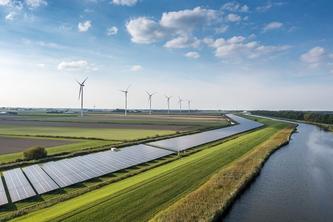
If the planet continues to suffer a loss of nature at current rates, world economies will lose almost 10 trillion U.S. dollars by 2050 and millions of lives will be affected, warns a new World Wildlife Fund report.
The Global Futures report aims to connect nature’s benefits to people (e.g., coastal protection, pollination) with measurable economic outcomes (e.g., gross domestic product, employment) across 140 countries. The report was created specifically for the United Nations General Assembly by a team of collaborators from WWF, the Global Trade Analysis Project and the Natural Capital Project at the University of Minnesota's Institute on the Environment.
U of M expert and lead author Justin Johnson talks about how this first-of-its-kind analytical tool can be used to calculate the impacts of nature’s decline on the world’s economies that can be used by governments, business and other actors to inform decision-making.
Justin Johnson
“Global Futures uses cutting-edge environmental and economic modeling to link ecosystem services with macroeconomic outcomes across 140 countries in all key industry sectors. In addition to assessing economic losses from following a business-as-usual approach, we also created a global conservation scenario to show that protecting ecosystem services is possible and yields better economic outcomes. We decided it was necessary to create this new scenario because even the most optimistic of the Shared Socioeconomic Pathway scenarios, used by most global modeling groups, still resulted in losses to the economy from changes in ecosystem services. The global conservation scenario combines smart climate policy with optimizing where land-use change happens, both at regional scales and at very fine resolution.
“More sophisticated or optimized scenarios will be considered in future work, but even this first pass shows that careful conservation planning that considers both economic and ecosystem values can outperform business as usual approaches, both for people and for nature.
“I hope the Global Futures report will serve as an incentive for world leaders to gear systems toward long-term sustainable prosperity for both humans and nature.”
Contact Information
Justin Johnson
[email protected]
(612) 625-1222
Justin Johnson is a senior scientist and economist on the Natural Capital Project — a collaborative partnership among the University of Minnesota’s Institute on the Environment, Stanford University, the Nature Conservancy and the WWF. Based at the University of Minnesota, Johnson will soon start as an assistant professor at the Department of Applied Economics. He specializes in developing mathematical models to estimate the value of ecosystem services and then programs software applications that stakeholders can use to make informed decisions.
Johnson’s research explores how ecosystem services affect economic systems and vice versa. Specialty topics are: food security, climate change, land-use change modeling and agricultural management in developing countries, calculable general equilibrium modeling, behavioral economics and agent-based economic simulation.
Johnson will be a part of a panel on March 9 at IonE Second Monday – also streaming live – to talk about Global Futures with Stephen Polasky, a professor in the College of Food, Agriculture and Natural Resource Sciences and IonE fellow; Jay Coggins, a professor in CFANS and IonE associate, and moderator Nathaniel Springer, lead scientist and associate at IonE.
- Categories:
- Business and Management





